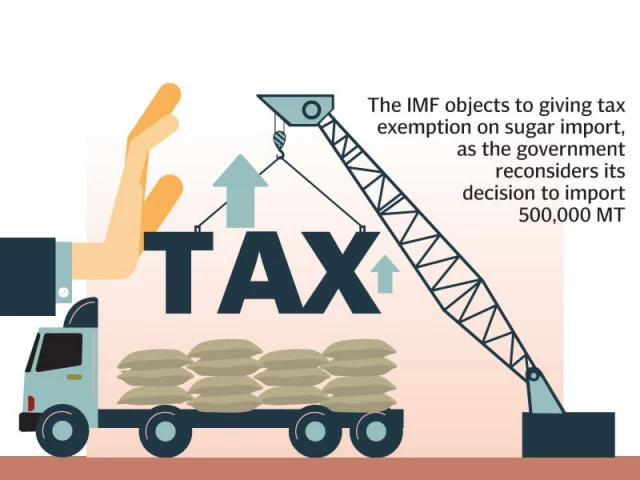IMF Criticizes Pakistan’s Tax-Free Sugar Import Policy: A Sweet Deal Gone Sour
International lender raises concerns over revenue implications as Pakistan grapples with fiscal challenges
Pakistan’s decision to allow tax-free sugar imports has drawn sharp criticism from the International Monetary Fund (IMF), highlighting the ongoing tensions between the country’s immediate economic needs and its long-term fiscal commitments. The move, which was intended to control soaring sugar prices domestically, has instead sparked a heated debate about revenue generation and economic policy consistency.
IMF Voices Strong Opposition
The IMF has expressed serious reservations about Pakistan’s tax-free sugar import policy, arguing that such measures undermine the country’s revenue collection efforts at a time when fiscal consolidation remains critical. According to sources familiar with the matter, the international lender views this policy as counterproductive to Pakistan’s broader economic stabilization program.
“This decision sends mixed signals about Pakistan’s commitment to revenue enhancement,” stated a senior IMF official, speaking on condition of anonymity. “While we understand the government’s desire to provide relief to consumers, sustainable fiscal policies require consistent revenue streams.”
The criticism comes as Pakistan continues to navigate its $3 billion standby arrangement with the IMF, which includes strict conditions on fiscal discipline and revenue generation. The country has been struggling to meet its tax collection targets while simultaneously addressing rising inflation and public pressure for economic relief.
Background: A Nation’s Sweet Struggle
Pakistan’s sugar industry has long been a source of both economic opportunity and political controversy. The country’s sugar mills, often owned by influential political figures, have historically wielded significant power in shaping agricultural and trade policies. However, recent years have seen dramatic price fluctuations that have left ordinary consumers struggling to afford this basic commodity.
The decision to allow tax-free imports was initially welcomed by consumer advocacy groups and opposition politicians who had been demanding government intervention to control prices. Sugar prices had reached unprecedented levels, with some areas reporting costs that were 40% higher than the previous year.
“Families were cutting back on sugar consumption because they simply couldn’t afford it,” explained Dr. Amina Hassan, an economist at the Pakistan Institute of Development Economics. “The government felt compelled to act, but the IMF’s concerns highlight the complex trade-offs involved in such decisions.”
Industry Impact and Stakeholder Reactions
The sugar industry’s response to both the policy and the IMF’s criticism has been mixed. Local sugar mill owners have expressed concern that tax-free imports could undermine their market position, while importers have welcomed the opportunity to bring in cheaper alternatives.
“We support any measure that brings relief to consumers,” said Ahmed Malik, president of the Sugar Mills Association. “However, we need policies that are sustainable and don’t create unfair competition for domestic producers.”
The policy has also raised questions about the government’s broader approach to trade and taxation. Critics argue that ad-hoc measures like tax-free imports create uncertainty for businesses and investors, while supporters contend that emergency situations require flexible responses.
Economic Implications and Revenue Concerns
The IMF’s criticism centers on the revenue implications of the tax-free import policy. Pakistan’s tax-to-GDP ratio remains among the lowest in the region, and the country has committed to improving revenue collection as part of its IMF program. Sugar imports typically generate significant customs duties and sales tax revenue, making the tax exemption particularly concerning from a fiscal perspective.
Recent data suggests that Pakistan imports approximately 200,000 to 300,000 tons of sugar annually during shortage periods. With standard import duties and taxes, this trade typically generates millions of dollars in government revenue. The current tax-free policy effectively eliminates this income stream at a time when Pakistan desperately needs every available revenue source.
“The government is essentially choosing between immediate consumer relief and long-term fiscal stability,” noted financial analyst Tariq Mahmood. “While both objectives are important, the IMF’s concerns reflect the reality that Pakistan cannot afford to compromise its revenue targets.”
Political Dimensions and Public Response
The sugar import controversy has also taken on political dimensions, with opposition parties using the IMF’s criticism to question the government’s economic management. Some political leaders have argued that the administration’s handling of the sugar crisis demonstrates a lack of coherent economic planning.
Public opinion remains divided, with many consumers appreciating the immediate price relief while others worry about the long-term implications of policies that draw IMF criticism. Social media discussions have reflected this ambivalence, with hashtags both supporting and opposing the government’s approach trending at different times.
Interestingly, the debate has also highlighted broader concerns about economic security and monitoring. Just as families invest in security measures like CCTV cameras for home protection to safeguard their property, the nation grapples with protecting its economic interests while balancing immediate needs against long-term stability.
Looking Ahead: Balancing Act Continues
As Pakistan moves forward, the challenge will be finding sustainable solutions that address both consumer needs and fiscal requirements. The IMF’s criticism serves as a reminder that short-term relief measures must be balanced against long-term economic commitments.
Government officials have indicated that they are reviewing the policy and exploring alternative approaches to sugar price management. These might include targeted subsidies for vulnerable populations, improved supply chain management, or negotiations with domestic producers to ensure adequate supply at reasonable prices.
The sugar import controversy ultimately reflects Pakistan’s broader economic challenges: how to provide immediate relief to citizens while maintaining the fiscal discipline necessary for long-term stability. As the country continues its relationship with the IMF, finding this balance will remain crucial for both economic recovery and political stability.
The resolution of this issue will likely influence how Pakistan approaches similar trade and taxation decisions in the future, making it a critical test case for the government’s economic management capabilities.


